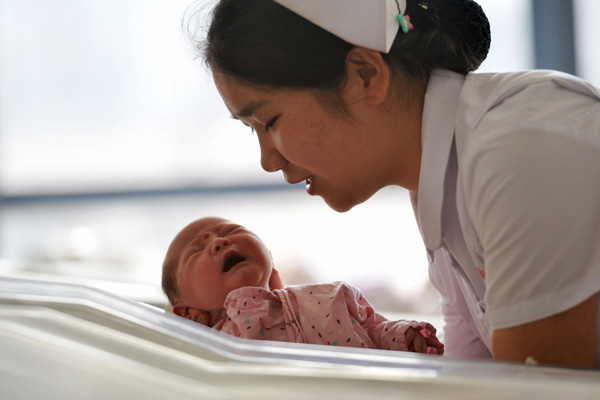Official explains changing marriage and childbirth trends in China
By Wang Xiaoyu | China Daily | Updated: 2023-06-13 07:30

Last month, the China Family Planning Association announced the launch of a new round of pilot projects in 20 municipal-level regions to foster a "new-era "marriage and childbearing culture as part of efforts to create a fertility-friendly environment.
The first batch of regional pilot projects was introduced in June last year.
Wang Pei'an, deputy director of the 13th National Committee of the Chinese People's Political Consultative Conference's population, resources and environment committee and executive vice president of the association, explained the initiative during a question-and-answer session with China Daily.
Q: How has China's marriage and childbirth culture changed over the years?
A: Young Chinese are increasingly embracing the trend of delaying marriage and having children, and tend to have fewer children overall. Meanwhile, more people are opting to get divorced, never marry, or have no children. Childbearing is no longer seen as a "must".
Among college students, a happy marriage and stable career are priorities when they consider having children, and they no longer feel ashamed about divorce.
Compared with their parents' generation, their low desire to have children stems from personal choice.
There are several reasons for these changes, including more years spent at school that delay marriage and plans to have children, and women's anxiety about balancing child-raising and advancing their careers.
Many young people now attach greater importance to personal advancement and realizing self-worth.
The cost of raising a child has also risen significantly, prompting complaints from families.
The average size of households is shrinking — from 3.44 people per household in 2000 to 2.62 in 2020 — as trends such as DINK (double income no kids) become more prevalent.
Q: When and why was the concept of a "new-era" marriage and childbearing culture raised?
A: The concept has been proposed as China faces a low fertility rate, a rising aging population, and uneven cross-regional population growth.
The number of children women of childbearing age plan to have is falling, and the nation's average fertility rate dropped from 2 in 1992 to 1.15 in 2021.
However, in Chinese culture, families still play an irreplaceable and fundamental role in providing care for the elderly and children.
They also offer emotional and economic support, as well as advancing production, community management and promoting civilization across society.
This concept has been formulated to meet people's aspirations for better lives.
The "new-era" marriage and childbearing culture focuses on promoting marriage and having children at proper ages, improving prenatal and postnatal care services, encouraging couples to share child-rearing responsibilities, and curbing the high costs of betrothal gifts and other outdated customs.
Q: Many young adults equate marrying at the right age to losing career advancement opportunities. What do you think?
A: From 2010 to 2020, the average age for a first marriage rose by 3.63 years for men and 3.95 years for women.
Getting married and having children can divert women's time and energy and potentially affect their performance at work.
The Chinese authorities have introduced new rules on parental leave, along with other supportive measures aimed at reducing the impact of marriage and child-raising on young people's careers and personal development.
To help them strike a balance between having a family and their careers, it is important to foster societal recognition of the value of marrying and having children at proper ages.
It is also important to build a system to spread child-raising costs across different sectors to prevent enterprises incurring economic losses due to hiring female employees, and to address young people's concerns.
Q: Why is it important to promote gender equality and sharing the burden of raising children between couples?
A: Gender inequality in families could exacerbate work-family conflicts among female workers. Facing pressure from work and family, many women who see bright career prospects are unwilling to have children.
Promoting gender equality can enhance marital relationships and encourage women to have children.
It is important to tap into the positive effects that gender equality can have on increasing fertility, and to make sharing the responsibilities of child care a consensus and custom observed by all of society.
Q: What additional measures should be introduced to build a fertility-friendly environment?
A: It takes time for supportive measures, such as tax deductions to offset the cost of raising a child, issuing fertility subsidies, and extending paternity and maternity leave, to produce results.
More efforts are needed to step up supportive policies on tax and housing, promote equal access to high quality education resources, offer incentives for employers who guarantee employees reproductive rights, and strengthen support for nursery care service providers and manufacturers of related products.
It is also important to improve nursery care services, upgrade maternity and paternity leave regulations, encourage the elderly to care for babies, guide young people in valuing the family, and advance the development of families.
Q: What experience has been gained from implementing the initiative in the first batch of pilot regions?
A: Authorities in these regions have launched awareness campaigns, such as making advocacy videos and posters, and getting volunteers, experts and different government departments to join efforts to strengthen publicity.
Some regions have taken note of local groups' views.
For example, the authorities in Lijiang, Yunnan province, have included objections from the Naxi ethnic group to high bride prices.
Meanwhile, in Ningbo, Zhejiang province, parent-child activities have been organized and a large number of fathers have explained their role in sharing responsibilities.
In Harbin, Heilongjiang province, group weddings have been held for newlyweds, who have been given brochures and related packages as part of measures to foster a new fashion of marriage.
























